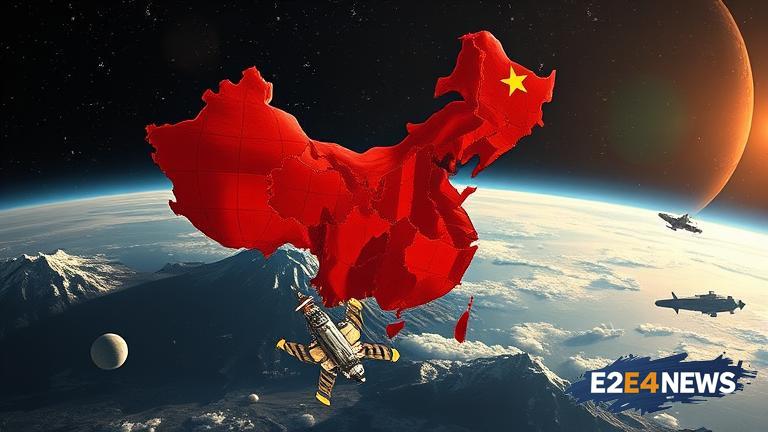China has unveiled its ambitious plans for space exploration and development, with a focus on lunar and Mars missions, as well as the establishment of a space station. The country has been actively pursuing its space program, with a series of successful launches and missions in recent years. The latest plans were announced by the China National Space Administration (CNSA), which outlined the country’s goals for space exploration and development over the next few years. According to the CNSA, China plans to launch a series of missions to the moon, including a lunar sample return mission and a mission to establish a permanent human presence on the lunar surface. The country also plans to launch a mission to Mars, with the goal of searching for signs of life on the red planet. In addition to these missions, China also plans to establish a space station in orbit around the Earth, which will serve as a base for future space missions. The space station will be equipped with a range of facilities, including laboratories, living quarters, and life support systems. China has also announced plans to develop a range of new space technologies, including advanced propulsion systems and materials. The country has been working to develop its space program, with a focus on indigenous innovation and self-reliance. The CNSA has been working closely with other government agencies, as well as with private companies and research institutions, to develop the country’s space capabilities. China’s space program has been making rapid progress in recent years, with a series of successful launches and missions. The country has launched a range of satellites, including communications satellites, navigation satellites, and Earth observation satellites. China has also launched a number of crewed missions, including the Shenzhou-12 mission, which carried three astronauts to the Tiangong space station. The country has also been working to develop its space infrastructure, including the establishment of a range of launch centers and tracking stations. China’s space program has been driven by a range of factors, including the need for scientific research, the development of new technologies, and the pursuit of national prestige. The country has been working to develop its space capabilities, with a focus on long-term sustainability and self-reliance. China’s space program has also been driven by a range of international cooperation agreements, including agreements with Russia, the European Space Agency, and other countries. The country has been working to develop its space capabilities, with a focus on cooperation and mutual benefit. China’s space program has been making rapid progress, with a series of successful launches and missions. The country has been working to develop its space infrastructure, including the establishment of a range of launch centers and tracking stations. China’s space program has been driven by a range of factors, including the need for scientific research, the development of new technologies, and the pursuit of national prestige. The country has been working to develop its space capabilities, with a focus on long-term sustainability and self-reliance. China’s space program has also been driven by a range of international cooperation agreements, including agreements with Russia, the European Space Agency, and other countries. The country has been working to develop its space capabilities, with a focus on cooperation and mutual benefit. The latest plans announced by the CNSA are a significant step forward for China’s space program, and demonstrate the country’s commitment to space exploration and development. The plans are also a reflection of China’s growing capabilities and confidence in space, and demonstrate the country’s determination to become a major player in the global space industry. The establishment of a space station and the launch of missions to the moon and Mars are significant milestones for China’s space program, and demonstrate the country’s ability to undertake complex and challenging space missions. The development of new space technologies, including advanced propulsion systems and materials, is also a significant step forward for China’s space program, and demonstrates the country’s commitment to indigenous innovation and self-reliance. Overall, China’s space program is making rapid progress, and the latest plans announced by the CNSA are a significant step forward for the country’s space capabilities.
